Okay, I admit I was getting a tad impatient with Michael O’Hearn after 10 days of trying to run down that “Titan” of the entertainment industry. After all, we go way, way back, and now he’d forgotten about little ole me?
I first met O’Hearn at the famous Los Angeles eatery The Original Pantry back in the early ’90s, when he was an awestruck pup visiting from Kirkland, Washington. The intro came courtesy of Marty Demirjian, a former manager of folks like Gary Strydom and Shane DiMora.
When Marty said he thought somebody had the goods to be a star, I made sure to look—and listen—carefully. In this case, yes, I was impressed. Told the strapping kid he should be in the movies or at least get a TV gig. See, once in a while I do get it right.
I’d done several cover stories on O’Hearn since he’d moved down south, so not getting a shout back, pronto, from the “American Gladiators” idol regarding the interview for this cover story was gnawing at me. Michael’s a good guy, however, and a veteran of dealing with the media (you’d be, too, if you’d been on nearly 500 covers worldwide), so I gave him the opportunity to explain when we finally got together at Gold’s Gym, Venice, on a Tuesday morning in May.
“Sorry, but I was in New York for a few days,” he said. “On Sunday I partied until 4:30 a.m. with P Diddy, Jay-Z and [NBC entertainment co-chairman] Ben Silverman,” O’Hearn offered.
Jay-Z? Did you forget about L.T.? And I know Silverman very well myself. Ruthless Ruth Silverman, that is.
Okay, Michael, I can live with the explanation. It’s not like you were hanging out at the local Costco, looking for deals. Well, you have been looking for deals, I suppose. And getting great ones, at that. Like the one that got you the gig as Luke on the popular soap opera “Days of Our Lives.” Or the possible contracts surrounding promising big-screen roles on flicks like a “Conan the Barbarian” sequel, “Captain America” and “Hercules.”
Plus, teaming up with Dr. Drew Pinsky on his radio show, not to mention a possible spot on Pinsky’s “Celebrity Rehab” reality show (not as one of the patients, folks) ain’t too shabby. Then there’s a new fitness book, Work Smarter, Not Harder, thoughts about competing in the Team Universe, speaking to kids at local schools about health and fitness and, of course, the time spent five days a week at Gold’s kicking your five training partners’ butts.
O’Hearn and I settled into our chairs in a quiet, second-floor room at Gold’s, overlooking a Pilates class. Enough “jousting,” Michael. Talk to me.
LT: Let’s backtrack a bit. This isn’t your first gig on “Gladiators,” is it?
MO: Correct. I was on the show in 1995 through ’96, but I didn’t get a lot of screen time because we only had five men and five women [compared to 10 on the current show], and I was the first alternate. I played Thor, the mighty god of thunder. We were syndicated—it was not a network show at that time. It was a blast.
LT: What was your size back then, compared to now?
MH: I was the same—6’3”, 250 pounds or so.
LT: You were a superior athlete in several areas even as far back as high school—champion bodybuilder and powerlifter; all-star credentials in football, wrestling and martial arts. Did that make it pretty easy for you when you did the initial tryout?
MH: Well, it was certainly easier than an acting gig because I’m already visually that character. Every time there is a show like the “Gladiators” or “Battledome” [O’Hearn was a featured player on that series in 1998 and ’99], where it’s both theatrical and athletic, I book it.
When I watched the original “Gladiators” in high school and college, I thought of those guys as walking superheroes. To me, they were the pinnacle of health and larger than life.
Learning from the guys who were already ahead of me on the first show really helped me initially—and what I learned from them carried over to the current show. Just being able to fight with “Nitro,” “Hawk” and the others, learning how they worked the mike. They were great TV.
LT: The show ran its course, but you stayed on track in the entertainment field. “Battledome” came along two years later and lasted two seasons. Eventually, you became a hot romance novel cover boy, segued into films and so forth.
MO: Yes, we had a couple of good seasons with “Battledome,” and it was fun, but it just didn’t catch on. What was nice was that I did the show from the ground floor—I did the pilot, and they booked me from that directly into the show. It was much more violent than the “Gladiators.” I got to go out there and beat heads. That was fun.
LT: One of your many advantages over fellow team members and contestants has always been your strength—especially considering that you’re a tested drug-free athlete. I’ve written about your powerlifting credentials in the past, but you got back into it last year and still set all-time marks, correct?
MO: Yes, I did. I moved up to the 275-pound division and did a 600-pound bench without a shirt, an 815 squat with no belt and 760 in the deadlift.
LT: I’ve always been curious about how much of a benefit that shirt gives somebody. Obviously, it’s much more than a minor aid.
MO: Oh, yeah, it can mean as much as 200, 300 pounds. Maybe more. You need to do a story on that. You put these shirts on and you can’t even move your arms [because the shirt forces them out straight], so you have to lift 1,000 pounds to even [force your arms to bend and] bring the weight down. I mean, no disrespect, but if you can’t do it walking around in posing trunks, then you can’t lift it.
LT: Where can I get one of those shirts? I want to say I benched 350. [O’Hearn and L.T. bust up.] Besides, I have to wear the shirt, because I sure as hell ain’t gonna strut around in posing trunks. Did you?
MO: [Laughs] No, but I did it in shorts, no shirt. In the squat, no suit, no belt, no knee wraps. No suit or belts for the deadlift, either. I don’t use belts because it’s just going to atrophy my back.
Again, with everything that I do—fighting, running, martial arts—why would I wear a belt lifting if I can’t wear it in a fight? It doesn’t help me. This is just my belief, and I’ve never been injured. And I’m stronger now than I’ve ever been in my entire life.
LT: You’ve had no major injuries in your athletic career?
MO: No. Now, humans get injured—I’ve heard that—but I don’t. [Both laugh.] There’s a thing called blunt force trauma, Wolf’s Law. If you do something over and over again, you are going to build up such strength to that. Have you seen those shows on the Discovery Channel? One of the segments shows a guy pounding things over and over with his fist. Eventually, he brings up even more strength in his fist; an average person would break his hand doing the same thing.
I have never lifted light. I lift heavy every workout, five days a week. I do one bodypart a day, and I will go ballistic on it. I train like that year-round. Now, my training method is great for me and for what I do. For somebody who is bodybuilding—or interested in general fitness—I say tone it down a bit. I admit my obsession in the gym leads to overtraining. I know I should stop, but I have such a passion for lifting, I can’t leave.
I won the Natural Universe four times, have broken records in powerlifting. Last year I won the West Coast Strongman competition. It involved pulling a truck, lifting the Atlas stones, log lifts, the clean and jerk, the farmer’s walk, bench, squat, deadlift—all those things.
LT: It’s no secret that people have questioned whether you’re really drug-free, especially with the type of weight you throw around. Do those rumors bother you?
MH: No—I love it! When people ask me if I’m on steroids, I say, “Thank you, that’s a real compliment.” I’m trying to prove you can do these things without drugs. To me, what have I accomplished if I used drugs?
LT: When you say you overtrain, how many sets are we talking?
MO: You know Joe DeAngelis? You have done stories on him, right? Well, Joe said something to me that really meant a lot. He said he’s never met anybody who is as consistently as strong as I am year-round.
When we train together, we don’t count sets; we just keep going at each other. [O’Hearn has five different training partners, as mentioned above, each for a different bodypart; “nobody can hang the whole week.”] I work out to beat the other guy, to destroy him. It’s fun for me; it’s like a fight.
LT: Yes, I can see the glee in your eye on the show, especially when the Joustmaster is ready to whack down his foe, often with one blow.
MO: You are very observant—yes, I really enjoy taking people down, in every form of competition.
LT: What fueled such a competitive drive in you? Were you that way when you were growing up?
MO: You know this: I grew up with nine brothers and sisters—I’m the youngest—and all of them did bodybuilding, powerlifting, wrestling and martial arts. My sister won the Emerald Cup, my other sister won the Washington Powerlifting Championships, my two brothers won the Mr. Washington bodybuilding title.
So I was always getting my ass kicked not only by my older brothers but by my older sisters too! I knew from an early age—I was eight, nine years old—about working out.
LT: Sounds as if the original season of “Survivor” should have been filmed at the O’Hearn household. No Ozzie and Harriet there!
MH: For sure. If you wanted to eat, you had to carry a fork and stab the other person. [Both laugh.] So I was bred to be a fighter, to be in this field.
LT: But you also grew up unable to read or write.
MH: Correct. Because I was bigger than the other kids, I skipped a grade and, in the process passed over the basics of reading and writing. Being that young, I didn’t understand it, thought I was slow, whatever.
So I took to sports even more so. As a kid you get teased when you are “different,” so that drove me even more to be the strongest kid in the school, the best athlete.
LT: Eventually, you were diagnosed with dyslexia.
MO: Yes, in the ninth or 10th grade. And I’m glad I had it because it helped me develop other senses to function in life. For example, I study scripts more than most people to adjust for the disorder. It made me who I am, and I wouldn’t change a thing.
LT: I’d say you’ve handled things quite well, Titan. Did the producers of the “Gladiators” approach you, or did you go to them? When did the tryouts take place, and did you feel you had it in the bag?
MO: It hasn’t even been a year since this all began. I have to admit I had my ego bruised a bit because I saw an announcement about the show in Variety, but nobody had contacted me. So I called my manager, told him I wanted to meet with the producers at NBC.
He said, “Don’t worry about the first couple of calls. We’ll get you on the callbacks, get you right to the producers, since they already know who you are.” I told him that’s not how I roll. If everybody else is trying out, then I need to try out.
I went into the tryouts saying I was going to end up as the team captain, to lead these guys into battle. I ended up setting all the records for the tryouts. Now I always have guys, both current Gladiators and competitors, coming up to me and saying they’re going to break my records. I just smile, say okay. But we are in our second season, and the records still stand.
LT: Where did the auditions take place?
MO: Everywhere. Here, New York, Texas, Chicago, Florida. I was 270 when I tried out and ran a 4.8 40-yard dash—you have to understand, we were on pavement, with loose gravel. I did 35 pullups in 60 seconds.
LT: Still, you knew that you’d be getting on the show before the first pullup.
MO: Not really.
LT: What? I mean, come on—you were on the first “Gladiators,” then “Battledome.” You’ve been the lead in films, been in front of the camera nearly as much as Jay Leno. Oh, speaking of Leno, that wasn’t very nice of you, knocking out that little guy with the joust just because he wanted your Klondike bar [O’Hearn did a skit on “The Tonight Show” on May 15]!
MO: [Laughs] Well, I did feel good during the tryouts, and everyone was saying it’s a sure thing for me, but nothing in Hollywood is a sure thing. There’s always the “don’t quit your day job” element in this business. On “Battledome” I never got beat, and I kept that personality through this audition process—I don’t lose, I’m going to lead this team and teach these guys how to be great Gladiators.
When I was in the last audition, one of the producers asked me what would happen if I lost. I told him I don’t lose. The guy told me later, after I got the show, that he was going to tell me, “You lost this—have a nice day.” He was actually thinking about doing that because of what I said. Nothing is for sure.
LT: Of course, the biggest difference between the first “American Gladiators” and the current one is that you’re on NBC now. And it opened with a bang, with a viewership of more than 12 million for the premiere last January 6 and following that up with more than 10 million fans watching the first episode the next night. Any other differences?
MO: I would say the biggest difference is that the characters are bigger. And although we’re playing characters, when you see me as Titan, you’re really just seeing Michael O’Hearn. That’s me; I’m just having fun. I love this stuff. I was born to do this, so it has come very naturally for me.
LT: Yes, you are definitely having fun, especially on the joust. I saw one instance in which the challenger came up to your knee, and you were filled with glee when he lasted about two seconds after being smacked in the head, then dropped into the water. No guilt there?
MO: [Laughs] I just wanted to get him off there quickly so he could get on to another game. No, I don’t feel bad for any of the guys because they are all athletes and have a lot of heart. Actually, I have found that the bigger guys don’t have the heart the smaller guys do.
LT: You say you aren’t playing a character this time? What is Titan?
MO: What you see on the show is who I am. Remember, when the original “Gladiators” was on, there was no Internet. So those people for the rest of their lives are going to be “Nitro” and “Zap.” The difference today is that people can go to the Internet and find out who Michael O’Hearn really is.
A lot of people will come to me and say, “Hey, Titan—Mike O’Hearn, how are you? Mr. Natural Universe,” and stuff like that. For me that is great, but you never want to get lost into a character.
LT: Were you shocked by the numbers when the show opened up huge?
MO: I was pleasantly surprised— let’s put it that way. We were all nervous, waiting to see how the ratings would be. It was the biggest NBC opening in four years or so. To open up that big was immense for us. Obviously, the fans loved it.
LT: What was the preparation time like before you hit the air? You must have had at least a month of training.
MO: We had one week of training. They put this together so quickly, people thought we were working on the games 24/7, but we didn’t get to practice any more than the contestants. Actually, we had less time, because we had to go out and do photo shoots, press junkets, etc.
LT: The joust is obviously your favorite event. Anything else really get you going?
MO: Well, like I said, I love all of this. But I’d say Powerball is my second-favorite game. Nothing is better than going into battle with another man and beating him down. [Smiles broadly] Can you imagine, I get to live that Gladiator lifestyle—I get to train, then go beat somebody up.
LT: And get paid for it. How have the filming and the traveling affected time in the gym?
MO: Well, here’s the best part about being lifetime drug-free—all I have to do is eat to maintain what I have. During the filming you don’t have time to work out. I just make sure to keep my diet exactly the same, and I do not change from the beginning of the taping through the final taping.
LT: How much time does it take to record a season?
MO: Two months. If it’s not on a daily basis, it’s every other day—on the off days you are just recouping.
LT: So that’s why you didn’t show up the couple of times I challenged you to a bench press contest. Guess you had a legit excuse to back out.
MO: I knew you’d understand [both laugh].
LT: Obviously, being a major player on a major network can open up a lot of doors. How’s that working for you, and what may be coming in the future?
MO: When you do a show like “Gladiators,” you hope it leads to other things. When I started bodybuilding as a teenager, I was hoping I could follow Arnold and go into television and movies. And that worked.
I have been blown away how much my life has changed since the show first aired five months ago. It has worked out that I’ve become the fans’ favorite male Gladiator, and that’s huge for me. I mean, on “Sunday Night Football” there’s a commercial of me. I drive by the NBC studio, and I see a five-story photo of me. It’s not just hyping “Gladiators,” it’s for all NBC shows.
It has led to my getting a part on “Days of Our Lives”; I shot it between the first and second seasons, and I’ll be going back again.
LT: Has that run already?
MO: Yes, in March. My character’s name is Luke, I own a bar, and I have a shady past, of course. I’m trying to change my life, be a good guy now. It will be a recurring role, but the producers are talking about creating a new character.
But, that’s not the only project. Ben Silverman has become a friend of mine, and he wants me all over the place. He’s talking about other shows, like “Chuck,” a new show coming out later this year called “King,” and “Knight Rider.”
LT: Wow, things are blowing up big time, guy.
MO: That’s not all. I get calls from my manager and PR person: “There’s talk about you playing Conan.” Yes, Arnold’s Conan movie, with a $100 million budget. The studio [Millennium Productions] brought me in to talk about the movie, talk about the script. That’s mind-blowing.
At this point I know less than my manager does, but because there’s no actual script at this point, the discussion has moved to another film they do have a script for—“Hercules.” Another $100 million project.
I left the office not sure exactly how they felt about me, but then I got a call from my manager to let me know they would be sending over the script, and I’m reading it now.
LT: You could be the new Steve Reeves, my all-time-favorite physique star. Can I get an autograph now, before you become unapproachable?
MO: [Busts up)] Yes, can you imagine that? And next week I go in to meet with Marvel about “Captain America.”
LT: An “Iron Man” type flick? How could you possibly measure up to Robert Downey Jr.? You know, he allegedly did 10 reps at 235 on the bench.
MO: Did he really? Wow, that’s not bad. Well, he did look good, and he pulled it off, big time.
LT: With so many exciting things on your plate, how are you keeping your feet on the ground?
MO: My manager and PR people keep me in check. They’ve had other clients who have been very successful, so they understand it.
LT: I hope it happens for you; I know better than anyone that yours hasn’t been the overnight success people may think it is. When did you move down here from Washington, 1992?
MO: Good memory, L.T.
LT: So I guess you’ll never compete in another bodybuilding contest or powerlifting meet again.
MO: You’ll see me at the Team Universe.
LT: Only you would dare to say that. Despite all of the other stuff, you’re still a bodybuilder and powerlifter at heart.
MO: Those things have gotten me where I am today. I can’t give that up; it’s my meditation. Seriously, I think the T.U. is a possibility because I’ve seen the changes over the years—the guys are looking so good now. It amps me up even more. I love the competition, the fight to be the best. I compete, not for the title, just to beat the guys. Know what I mean? There is a difference. The title is icing on the cake.
LT: Done with powerlifting though?
MO: Yes, but I love strongman competition. You can lift a truck. That’s really cool.
LT: Despite your mainstream successes, you are still deeply involved in the fitness industry. I know you and Sherlyn Roy have created your own company. Tell us about it.
MO: It’s called S.H.I.F.T.I.N.G.—Serious High Intensity Fitness Training Integrating Nutritional Guidelines. We work with clients and trainers throughout the country using our beliefs in nutrition and training, which Sherlyn and I follow. Currently, with my schedule being as crazy as it is, Sherlyn has taken over most of the company, but here’s the gist of what our company is about.
Nutritionally, we practice and believe that one has to eat a good calorie level throughout training—keeping the caloric intake high and exercising it off instead of dieting it off. When it comes to training, we believe in sticking with the basics and challenging the amount of weight you can push, pull or press, whether you are male or female.
We both train a bodypart per day: legs, chest, back, shoulders and arms. Each training session has four to six exercises, and each exercise should be four sets, with three to eight reps.
Sherlyn is a great example of our program. She trained for 10 years and got her body to a certain level of physique and athleticism. After six months of training under this program, with a focus on competition, she completely transformed her physique and stepped onstage and won the fitness contest and got second in figure at the 2006 Cal. Then she won the figure overall a week later at your Junior Cal.
Confirming that our program works, she moved on to compete at the Figure Nationals and got seventh out of 50-plus females in her class in her first-ever national-level competition [Roy also placed ninth in her class that same year at the extremely deep USA].
LT: By the way, are the rumors true that you inked a deal with VyoTech Supplements?
MO: Yes, they are. Me and Shawn Ray. We’re moving forward and are going to blow this thing up. This will be something that I’ll be able to get my hands into, help create new products and so forth.
LT: How many hours do you need in a day to be Michael O’Hearn right now?
MO: I still get up at 3 a.m., kid.
LT: Not when you hang with P. Diddy and Jay-Z!
MO: You’re right—got in at 4:30 in the morning but got up at 7 a.m. for my flight back to Los Angeles. But come on, when you have a chance to hang out with those guys, you’re not going to pass because you need to go to bed early—like, “If I see you the next time I’m in New York, we’ll do lunch.”
Editor’s note: To contact Michael O’Hearn about how to smack people around and get paid for it, write to him at mike@mikeohearn.com. IM













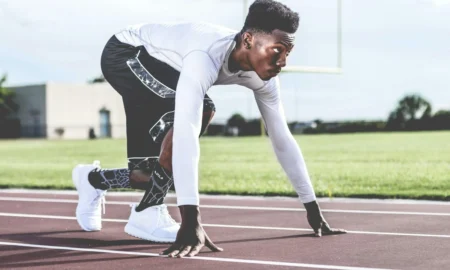


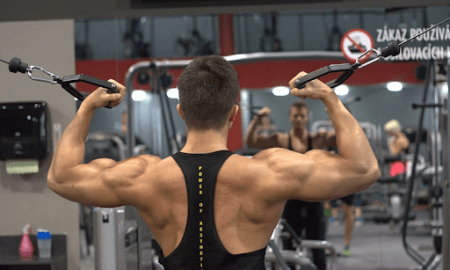
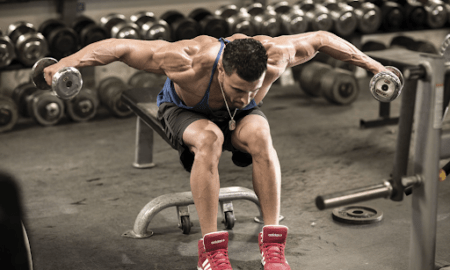
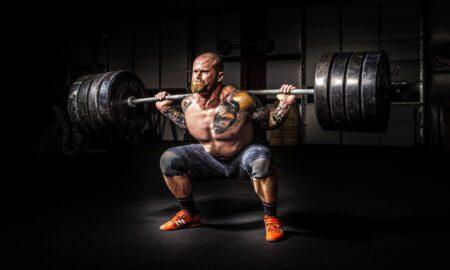
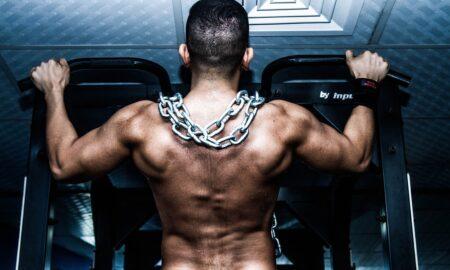
You must be logged in to post a comment Login